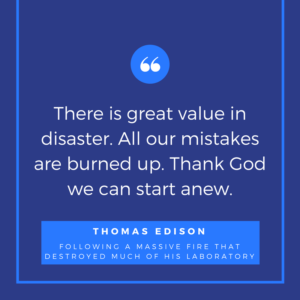I’ve said this before, and I’ll say it again (and again): challenges grow us. So the secret to overcoming adversity might not be to overcome it at all, but rather to change the way you view and approach it.
As we learn this and become more adept in how we tackle problems, we both
- Develop wiser ways of dealing with challenges and
- Begin to appreciate those challenges for how they’ll help produce growth in the long run
It’s akin to how a huge wave can strike fear into a new surfer, but will actually inspire and excite an expert in the sport.
Overcoming Adversity by Recognizing Its Opportunity
Those who are newer to the game tend to respond to a problem by immediately seeking a “remedy.” Hence our focus on overcoming adversity, rather than on looking to the opportunity it carries with it.
 Of course, there’s nothing inherently wrong with solving a problem (although there are ways to do it right—and therefore ways to do it not-so-right).
Of course, there’s nothing inherently wrong with solving a problem (although there are ways to do it right—and therefore ways to do it not-so-right).
But even as you struggle toward solutions, or wait for the right time to do so, you can look at the adversity you’re facing and examine its potential. You can leverage that adversity to provide better leadership in difficult times. And you can consider how you can use that moment to learn, grow, or create new opportunity.
I’ve specifically identified 7 powerful success forces that get unleashed when we change our focus from overcoming adversity to unleashing its power in our life and work.
The 7-Part Power of a Problem
Face your next challenge not only with an eye on overcoming adversity, but also with an awareness of the powerful benefits it carries with it:
1. Adversity rewards natural strengths
In adversity, we tend to go with our gut more than we do in moments of ease and prosperity. When our brain is clouded by a problem, our natural instincts take over (including the instinct for survival).
In the absence of “luxuries” like ample time or brain space—both of which can also give you room to overthink things—you naturally function according to your power-alley attributes.
Which is to say, you function at your best.
2. Adversity exposes weaknesses
When you’re in a moment of disaster, it’s extremely difficult to hide all the stuff that’s weak and broken in your team, organization, procedures, or anything else.
This has a lot to do with that old adage “when it rains it pours.” When things get messy, all the messes come out.
Okay, so now the trees are all blown down. The camouflage is burned away. What’s left? Exposed weakness.
And once you know what’s broken, you know what you need to fix. That fix might lead to resolution of the problem in question, but it will also certainly help you avert future disaster.
3. Adversity creates opportunities
Something that you thought was inconsequential might actually be an opportunity, but you won’t see that until force reveals it.
For example, we all know stories of folks who
- Lose a job
- Therefore take some time to re-asses their vision and natural attributes—those very strengths they once took for granted because they’re so inherent
- Finally embark on a completely new career where they find a level of success and fulfillment they never would have achieved otherwise
4. Adversity kills old habits
When you’re taken down to your core, the senselessness of unhealthy habits can really hit home.
“I can’t do that anymore.”
“I can’t subsidize it.”
“I don’t have time for it.”
“I can’t put up with it now that I’m in this situation.”
For example, let’s say you have a habit of clicking on every e-mail you get the instant it comes in. Most days, you don’t even recognize the productivity suck you’re creating when you do this, not to mention the amount of time you lose addressing un-ripe problems (I’ll blog about the ripening of a problem some day, but in the meantime, you can read about it here).
But today, you’re dealing with a crisis. Simply put, you don’t have time to open every e-mail that hits your inbox the second it arrives. You must prioritize in order to keep your head above water.
And so you kick that tyrannical e-mail habit to the curb where it belongs—changing the bad habit much faster than you ever could have without the pressure of a problem.
5. Adversity releases pent-up energy
In a crisis situation, there’s a sense of urgency that can get you moving. “When the going gets tough, the tough get going,” right?
We all know that in an emergency, adrenaline allows people to run faster, lift heavier things, etc. Life obstacles have the same effect.
Which is why sometimes, the answer to the amazed question “How’d you do that?” is “Because I had to!”
6. Adversity inspires risk-taking
To put it bluntly, when you’re back at the zero mark, there’s less to lose. If you take a risk when you’re stripped down, you often risk less than you do when you’re riding high.
Forget “What’s to lose?” In great stories of overcoming adversity, the real question is “What’s to gain?”
7. Adversity destroys old paradigms
See “kills old habits” above. Because paradigms—or mental models—are essentially just habits of thought.
If some broken old way of thinking is actually holding you back, a crisis is likely to reveal that, expose you to new ways of thinking, and—best of all—give you the shake-up you need to actually change the paradigm for the better.
In the coming weeks, we’re going to look at some real and famous examples of wildly successful folks who excelled not because they focused on overcoming adversity, but because they embraced it (or tripped over it!) and recognized the opportunity it brought.
If you have other great stories of overcoming adversity—whether famous or personal—please share them in the comments below.




Leave a Reply